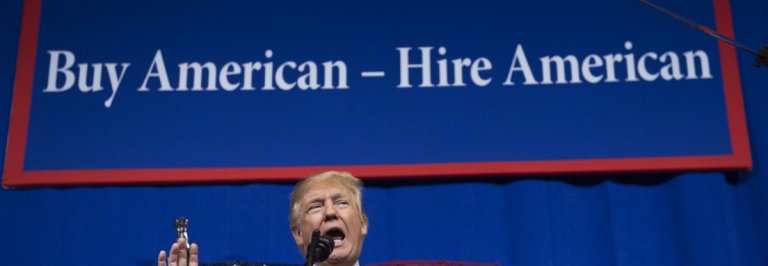
Things used to be a lot different for the H-1B visa program.
Before US President Donald Trump took office, H-1B visa holder’s spouses could legally work, while the legal status of their dependents remained secure and there was generally more goodwill among locals about this group of foreign workers and graduates filling gaps in the US labour market for specialty occupations.
All that changed under the Trump administration and a big part of it can be traced to this much-talked-about “Buy American, Hire American” executive order he signed in April 2017.

US President Donald Trump holds up a Buy American, Hire American Executive Order after signing at Snap-On Tools in Kenosha, Wisconsin, April 18, 2017. Source: AFP/Saul Loeb
But what’s this order about and why do people keep linking it to the H-1B program?
For that, we have to travel back in time to the US presidential election campaign in 2016, where Trump campaigned under the “America First” theme. In his inaugural speech, he said:
“From this day forward, a new vision will govern our land. From this day forward, it’s going to be only America first. America first.
Every decision on trade, on taxes, on immigration, on foreign affairs will be made to benefit American workers and American families. We must protect our borders from the ravages of other countries making our products, stealing our companies and destroying our jobs. Protection will lead to great prosperity and strength.”
In April 2017, he signed the Buy American and Hire American Executive Order to fix problems with the H-1B visa program that was deemed to have gone awry, also seeking to end the “theft of American prosperity,” which he said had been brought on by low-wage immigrant labor.
More than half of all H-1B visas have been awarded to Indian nationals https://t.co/QCNRTYxXhU pic.twitter.com/5fusP85vdN
— Pew Research Center (@pewresearch) June 5, 2017
Behind this rhetoric, what the policy really calls for are relatively modest. This is what the order said in Section 5(b):
“In order to promote the proper functioning of the H-1B visa program, the Secretary of State, the Attorney General, the Secretary of Labour, and the Secretary of Homeland Security shall, as soon as practicable, suggest reforms to help ensure that H-1B visas are awarded to the most-skilled or highest-paid petition beneficiaries.”
But there has no doubt been big changes to the US immigration policies. The US Citizenship and Immigration Services (USCIS) – the federal agency in charge of adjudicating H-1B petitions – states on its website that pursuant to the order, it is working on “a combination of rulemaking, policy memoranda, and operational changes” to implement it.
So far, this has resulted in, among other changes:
- Plans to end special work permits issued to some spouses of H-1B visa holders. The plan to the end this Obama-era executive order is reportedly in the final stages and now headed to the Office of Management and Budget;
- More challenges and requests for more evidence by USCIS (45 percent according to the New York Times) causing increased denials and delays to the issuance of some visas;
- A policy memo that makes it difficult for companies to prove their H-1B employees at third-party worksites possess specific, non-qualifying speculative assignments in speciality occupations;
- more surprise visits to sites where large numbers of H-1B workers are employed by USCIS’s fraud teams.
Who is hiring foreign workers with H-1B visas? These were the top prospective employers in fiscal year 2016: https://t.co/ZUykfjbMdA pic.twitter.com/oDyuuo43MU
— Pew Research Center (@pewresearch) August 19, 2017
More changes are in the pipeline for the future too. According to attorney Jason Finkelman, the Trump administration’s Unified Agenda announced last year that there is intent to redefine the term “specialty occupation” to “increase the focus on truly obtaining the best and brightest.”
Finkelman wrote: “The proposal would also “revise the definition of employment and employer-employee relationship to better protect US workers and wages.” This includes “additional requirements to ensure employers pay appropriate wages to H-1B visa holders””.
Lastly, the H-1B visa lottery system may be scrapped for an “electronic pre-registration program for cap-subject H-1B applicants” and tweaking the lottery selection process so visas are issued to the “most skilled or highest-paid petition beneficiaries.”







